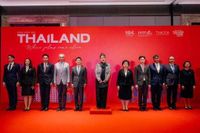In a significant and controversial development, Chinese billionaire Li Ka-shing, at 96 years old, has found himself at the center of fierce scrutiny from Beijing regarding his plans to sell major port operations, including two vital ports in Panama, to American investment behemoth BlackRock. The deal has incited strong reactions within China, with government officials and media outlets condemning Li's actions as a betrayal to the Chinese people, labeling him variously as a "traitor" and a "leech" attempting to profit at the expense of national interests.
On March 15, 2025, the State Council of China openly criticized Li, claiming he was "betraying the Chinese people entirely" as he moved forward with plans to divest from critical infrastructure assets in favor of foreign investment. The sharp denunciation came through an article by Wang Junxi published on the government-affiliated website, where Li was described as behaving in an "immature" manner for his decision. This marks a continuation of the intense scrutiny Li has faced since he began selling off substantial Chinese assets, a trend that escalated after Beijing's tightening grip on the Hong Kong economy and politics over the last decade.
Wang's article articulated deep concerns about the implications of Li's deal, suggesting that it could enable the U.S. to exert greater control over strategic maritime routes. The president's administration in the United States has expressed a desire to reclaim control over the Panama Canal, further intensifying hairs on both sides of this geopolitical divide.
In the background of Li's controversial divestiture is the context of rising tension between the United States and China, particularly in the realms of trade and geopolitical influence. The distribution of power and assets connected to the Panama Canal has emerged as a significant point of contention, prompting analysts to view the sale as more than a business transaction but rather a tilt in global power dynamics. According to Victor Li, the tycoon’s son and current president of CK Hutchison, the sale of the Hutchison Ports' 80% stake to BlackRock would be finalized—valued at an estimated $22.8 billion—over the next several months, a move he defended in light of market conditions during a recent interview. “The strategic benefits needed weighing against the realities of which way the winds are blowing in our industry,” Victor noted, justifying the corporate maneuvering as necessary amid a volatile global landscape.
Reactions from social media and public commentary further elucidate the gravity of the situation. Amidst the backlash, numerous voices have risen to critique Li's motivations. Comments online reflect sentiments that the billionaire's decisions prioritize profit over national loyalty, with descriptions of his actions revolving around motifs of treachery and self-interest. Many commentators argue that the ports represent a critical advantage for China in global shipping, thus Li's decision has resonated as a profound strategic error.
Moreover, academics and analysts have pointed out that the implications could stiffen U.S.-China relations. Prompting discussions from economic specialists, there are speculations about BlackRock’s newfound ability to influence significant logistical decisions affecting Chinese goods traveling through the Panama Canal. Chinese authorities fear that control of the ports by a U.S. firm could enable sanctions or other punitive economic measures aimed at crippling Chinese shipping endeavors.
On March 19, 2025, officials in China announced they would assess Li's dealings through a comprehensive review aimed at identifying any security breaches or anti-competitive behaviors. This escalated into serious discussions within the government, varying from the need for intervention to regulate international business deals involving Chinese assets to concerns about oversight and national security interests.
The investigation into Li's port deal has garnered attention from China's top leaders, including President Xi Jinping and Premier Li Qiang, who have been reportedly alert to the challenge posed by foreign control over essential infrastructure. Former Hong Kong chief executive Leung Chun-ying remarked that the Panama Canal could become a new battlefield reminiscent of past geopolitical tensions, reflecting broader national anxieties regarding the balance of power.
Through all these developments, the legacy of Li Ka-shing as a leading tycoon has been placed in jeopardy, raising questions about the future of Hong Kong's business landscape. With mounting pressures, many now speculate on whether Li’s ability to navigate the shifting dynamics will determine not only his businesses’ fortunes but potentially impact Hong Kong’s economic positioning in the face of tightening oversight from Beijing.
Notably, this is not the first time Li has faced intense criticism from the Chinese government. In 2015, a publication aligned with Beijing once accused him of abandoning China for greener pastures in Europe after divesting significant portions of his mainland holdings. This historical precedent sets the context for the current sentiment, which emphasizes feelings of betrayal and abandonment tied to his business maneuvers.
The rapidity of these developments serves to underscore the complex interplay between business interests and national identity in modern China. With increasing scrutiny of foreign interests and continuous amplification of nationalist sentiments, how Li Ka-shing ultimately aligns his operations could significantly reshape the perception of Hong Kong's tycoon class as well as influence China's strategy toward international trade and investment.
His situation illustrates a delicate balancing act, navigating personal profit while adhering to the broader context of national importance, making it a pivotal moment not only for Li but also for future business partnerships involving international firms operating within the matrix of Chinese governance.





